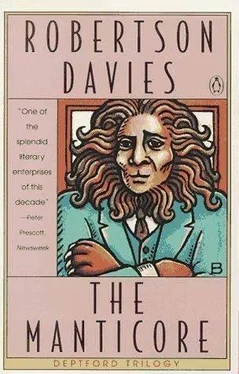Robertson Davies - The Manticore
Здесь есть возможность читать онлайн «Robertson Davies - The Manticore» весь текст электронной книги совершенно бесплатно (целиком полную версию без сокращений). В некоторых случаях можно слушать аудио, скачать через торрент в формате fb2 и присутствует краткое содержание. Жанр: Триллер, на английском языке. Описание произведения, (предисловие) а так же отзывы посетителей доступны на портале библиотеки ЛибКат.
- Название:The Manticore
- Автор:
- Жанр:
- Год:неизвестен
- ISBN:нет данных
- Рейтинг книги:3 / 5. Голосов: 1
-
Избранное:Добавить в избранное
- Отзывы:
-
Ваша оценка:
- 60
- 1
- 2
- 3
- 4
- 5
The Manticore: краткое содержание, описание и аннотация
Предлагаем к чтению аннотацию, описание, краткое содержание или предисловие (зависит от того, что написал сам автор книги «The Manticore»). Если вы не нашли необходимую информацию о книге — напишите в комментариях, мы постараемся отыскать её.
The Manticore — читать онлайн бесплатно полную книгу (весь текст) целиком
Ниже представлен текст книги, разбитый по страницам. Система сохранения места последней прочитанной страницы, позволяет с удобством читать онлайн бесплатно книгу «The Manticore», без необходимости каждый раз заново искать на чём Вы остановились. Поставьте закладку, и сможете в любой момент перейти на страницу, на которой закончили чтение.
Интервал:
Закладка:
MYSELF: My mother knew great unhappiness.
DR. VON HALLER: You have said that many times. You have even said it about periods when you were too young to have known anything of the sort. It is a kind of refrain in your story. These refrains are always significant. Suppose you tell me what genuine reasons you have for thinking of your mother as an unhappy woman. Reasons that Mr. Justice Staunton would admit as evidence in his strict court.
MYSELF: Direct evidence? Does a woman ever tell her children she is unhappy? A neurotic woman, perhaps, who is trying to get some special response out of them by saying so. My mother was not neurotic. She was a very simple person, really.
DR. VON HALLER: What indirect evidence, then?
MYSELF: The way she faded after, that terrible Abdication Christmas. She seemed to be more confused than before. She was losing her hold on life.
DR. VON HALLER: She had been confused before, then?
MYSELF: She had problems. My father's high expectations. He wanted a brilliant wife, and she tried to be one, but she wasn't cut out for it.
DR. VON HALLER: You observed this before her death? Or did you think of it afterward? Or did somebody tell you it was so?
MYSELF: You're worse than Caroline! My father told me so. He gave me some advice one time: Never marry your childhood sweetheart, he said; the reasons that make you choose her will all turn into reasons why you should have rejected her.
DR. VON HALLER: He was talking of your mother?
MYSELF: He was really talking about a girl I was in love with. But he mentioned Mother. He said she hadn't grown.
DR. VON HALLER: And did you think she had grown?
MYSELF: Why would I care whether she had grown or not? She was my mother.
DR. VON HALLER: Until you were fourteen. At that age one is not intellectually demanding. If she were alive now, do you think that you and she would have much to say to one another?
MYSELF: That is not the kind of question that is admitted in Mr. Justice Staunton's court.
DR. VON HALLER: Was she a woman of any education? Had she any mind?
MYSELF: Does it matter? I suppose not, really.
DR. VON HALLER: Were you angry with your father because of what he said?
MYSELF: I thought it was a hell of a thing to say to a boy about his mother, and I thought it was an unforgivable thing to say about the woman who had been his wife.
DR. VON HALLER: I see. Suppose we take a short cut. I wish you would take some time during the next few days to sort out why you think your father must always be impeccable in conduct and opinion, but that very much must be forgiven your mother.
MYSELF: She did try to commit suicide, remember. Doesn't that speak of unhappiness? Doesn't that call for pity?
DR. VON HALLER: So far we do not know why she made that attempt. Your sister could be right, don't you see? It could have been because of Ramsay.
MYSELF: That's nonsense! You've never seen Ramsay.
DR. VON HALLER: Only through your eyes. As I have seen your parents. But I have seen many women with lovers, and it is not always Venus and Adonis, I assure you. But let us leave this theme until we have done more work, and you have had time to do some private investigation of your feelings about your mother. See what you can do to form an opinion of her as a woman – as a person you might meet… But now I should like to talk for a moment about Felix. You tell me he has been appearing in your dreams – What does he do there?
MYSELF: He doesn't do anything. He's just there.
DR. VON HALLER: Alive?
MYSELF: Alive as he was when I knew him. He seemed to have a personality, you know. Rather puzzled and considering, and I did all the talking. And he usually agreed. Sometimes he was doubtful and said no. But his attention seemed to lend something to whatever I had talked about or decided. Do I make any sense?
DR. VON HALLER: Oh, yes; excellent sense. These figures we have in our deep selves, you know, have a way of being both external and internal. That one we talked of – the Shadow – he was inward, wasn't he? And yet as we talked, it appeared that so many of the things you disliked so strongly about him were also to be found in people you knew. You were particularly vehement about Netty's brother, Maitland Quelch -
MYSELF: Yes, but I should have made it clear that I very rarely met him. I just heard about him from Netty. He was so deserving and he had his way to make in the world single-handed, and he would have been so glad of some of the chances I hardly seemed to notice, and all that sort of thing. Matey's struggle to qualify as a Chartered Accountant pretty much paralleled my own studies for the Bar, but of course in Netty's eyes everything had been made easy for me, whereas he did it the hard way. Meritorious Matey! But when I met him, which was as seldom as decency allowed, I always thought he was a loathsome little squirt -
DR. VON HALLER: I know. We went into that quite extensively. But in the end we agreed, I think, that you simply read into Matey's character things you disliked, and these proved after some more investigation to be things which were not wholly absent from your own character. Isn't that so?
MYSELF: It's difficult for me to be objective about Matey. When I talk about him I feel myself becoming waspish, and I can't help describing him as if he were some sort of Dickensian freak. But is it my fault he has damp hands and a bad breath and shows his gums when he smiles and calls me Ted, which nobody else on God's green earth does, and exudes democratic forgiveness of my wealth and success -
DR. VON HALLER: Yes, yes; we were through all that, and at last you admitted that Matey was your scapegoat – a type of all you disliked and feared might come to the surface in yourself – please, one moment – not in these physical characteristics but in the character of the Deserving Person, ill rewarded and ill understood by a careless world. The Orphan of the Storm: the Battered Baby. You don't have to blush for harbouring something of this in your most secret image of yourself. The important thing is to know what you are doing. That tends to defuse it, you understand. I was not trying during those difficult hours to make you like Matey. I was trying to persuade you to examine a dark corner of yourself.
MYSELF: It was humiliating, but I suppose it must be true.
DR. VON HALLER: The truth will grow as we work. That is what we are looking for. The truth, or some part of it.
MYSELF: But although I admit I projected some of the least admirable things in my own character on Matey – you notice how I am picking up words like "projected" from you – I have a hunch that there is something fishy about him. He's too good to be true.
DR. VON HALLER: I am not surprised. Unless one is very naive, one does not project one's own evil on people who are especially good. As I have said, if psychiatry worked by rules, every policeman would be a psychiatrist. But let us get back to Felix.
MYSELF: Does his appearance now mean some sort of reversion to childhood?
DR. VON HALLER: Only to an emotion you felt in childhood, and which does not seem to have been very common with you since. Felix was a friend. He was a loving friend, but because of your own disposition, he was very much a thinking, considering friend. Now just as the Shadow makes his appearance in this sort of personal investigation, so does a figure we call the Friend. And because you have worked well and diligently for the last few weeks, when the going cannot have been very pleasant, I am glad to be able to give you good news. The appearance of the Friend in your inner life and in your dreams is a favourable sign. It means that your analysis is going well.
MYSELF: You're quite right. This probing and recollecting hasn't been pleasant. There have been times when I have been annoyed and disgusted with you. There were moments when I wondered if I were really out of my mind to put myself in the hands of anyone who tormented me and thwarted me as you have done. DR. VON HALLER: Quite so. I was aware of it, of course. But as we go on you will find that I seem to be many things to you. If you understand me, part of my professional task is to be the bearer of your projections. When the Shadow was under investigation, and so much of your inferior self was coming to light, you found the Shadow in me. Now we seem to have awakened the image of the Friend in your mind, your spirit, your soul – these are not scientific terms but I promised not to deluge you with jargon – and perhaps I shall not now be so intolerable.
Читать дальшеИнтервал:
Закладка:
Похожие книги на «The Manticore»
Представляем Вашему вниманию похожие книги на «The Manticore» списком для выбора. Мы отобрали схожую по названию и смыслу литературу в надежде предоставить читателям больше вариантов отыскать новые, интересные, ещё непрочитанные произведения.
Обсуждение, отзывы о книге «The Manticore» и просто собственные мнения читателей. Оставьте ваши комментарии, напишите, что Вы думаете о произведении, его смысле или главных героях. Укажите что конкретно понравилось, а что нет, и почему Вы так считаете.












